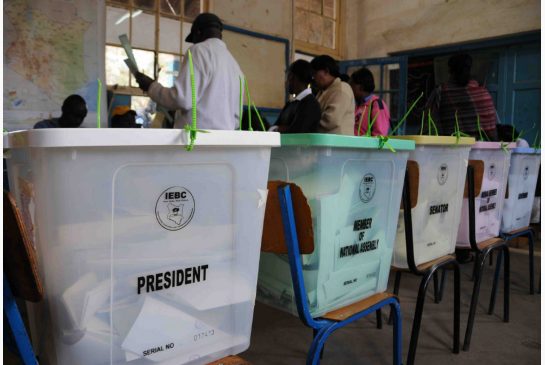GENERAL ELECTION DEBACLE COSTS KENYA’S IEBC PUBLIC TRUST
March 4, 2013 will be etched in Kenya’s history books. This was the first Kenya national election since the new constitution was promulgated in August 2010. For the first time, Kenyans voted simultaneously for six elective positions created by the new Constitution – from president to county ward representative.
The election was conducted by Independent Elections and Boundaries Commission (IEBC), a creature of the new Constitution which was highly trusted by the public after the disbarment of the Electoral Commission of Kenya (ECK).
However, following the 2013 General Election and controversial announcement of Jubilee Coalition as a winner in the presidential vote, the Kenya’s electoral body’s popularity has dropped, as a section of Kenyans have expressed a loss of faith in it.
This is in the backdrop of the traumatic events of 2007 elections, where most Kenyans lost trust in the electoral process.
The IEBC earned the public trust when it introduced digital technology, the Biometric Voter Registration (BVR) and the Electronic Voter Identification (EVID) systems. These were meant to list voters electronically and identify them through the use of finger prints during voting. The political parties and contenders in the General Election widely endorsed the new polling technologies.
The IEBC promised the public a free and fair election and Kenyans put their belief in them by registering in large numbers, long queues at the polling stations could reveal it. The new electoral body spent a huge amount of taxpayer’s money to plan for this landmark election which was closely watched by the whole world.
The voting process was not as quite smooth as expected. The polling equipment arrived late in some areas forcing the voters to stand in queues for long hours. There was also confusion regarding to the arrangement of the queues – whether they were to be organised according to first name of surname. This led to unnecessary crowding at the polling stations.
According to the Africa Centre for Open Governance (Africog), only 50 per cent were indicated as having used the EVIDs. There were cases of voters missing their names in the voters’ register, forcing the IEBC to go back to the old style of voting – use of paper copies of the voter register, raising questions on the validity of the election.
The poll was the biggest budget election in the history of Kenya. The introduction of EVIDs and Electronic Results transmission systems, which both failed, raises issues whether the budgetary allocation was worth it. Questions are still raised why the IEBC did not consider a backup mechanism for the exercise. This brought out a high level of incompetence and unreliability from the electoral body.
Almost everything was to the contrary of the expectations of many Kenyans. When the Jubilee Coalition was announced winner in the presidential election, the Coalition for Reforms and Democracy filed an election petition in the Supreme Court of Kenya, seeking nullification of the presidential vote following allegations of anomalies in the voting process.
All eyes were on Kenya during that time, with both local and international press almost certain violence would erupt as was the case in the previous 2007 General Election. Quite contrary, peace was preached by all means before, during and after the elections. The security was beefed up in every polling station and in every corner of the country.




No wonder, CORD organized peaceful demonstration to disband IEBC. This new system should be taken for a pilot spin before 2017.